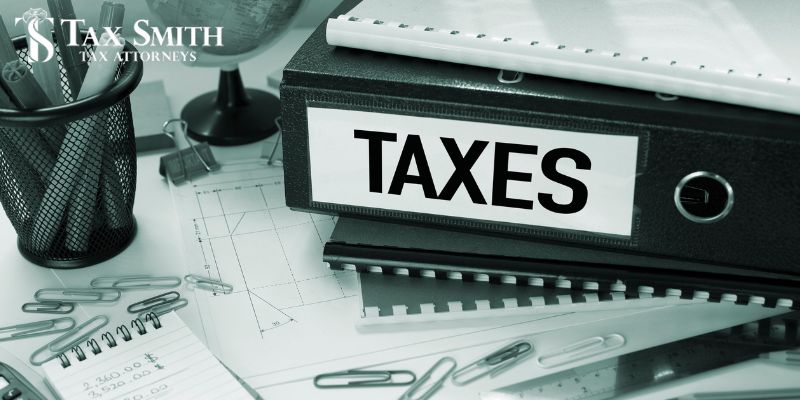1548 The Greens Way – Ste. 4 Jacksonville Beach FL 32250
Jacksonville State Tax Attorney
Jacksonville State Tax Lawyer
In Jacksonville, as in the rest of Florida, residents and businesses are subject to various taxes governed by state and local tax laws. Florida is known for not having a state income tax, which can benefit individuals and businesses. However, it is essential to be aware of other applicable taxes. These include sales tax, property tax, corporate income tax for certain companies, and various local taxes. Jacksonville residents should also consider the impact of any federal income tax on their financial situation.
If you’re facing challenges with tax-related issues, consulting a Jacksonville tax relief attorney can help you navigate complex tax laws and protect your financial interests. At TaxSmith, LLC, we provide expert guidance to ensure compliance and minimize tax liabilities while keeping you informed of the best legal strategies available.

What Are the Most Common Legal Tax Disputes in Jacksonville?
Taxpayers in Jacksonville may face various legal disputes related to taxes. The most common issues include:
- Tax Audits and Assessments: Taxpayers in Jacksonville may face disputes with the IRS or Florida Department of Revenue during the audit process. These disputes can arise from disagreements over the interpretation of tax laws, deductions or credits claimed, or the documentation provided to substantiate income or expenses. Taxpayers may also dispute the additional tax liability or adjustments proposed by the tax authorities following the audit.
- Tax Penalties and Interest: Jacksonville taxpayers may face disputes concerning penalties and interest charges imposed for various reasons. These include a late filing or payment, underreporting income, or negligence in maintaining records. Taxpayers can challenge the applicability or calculation of these charges. They can argue for reasonable cause or other mitigating factors to reduce or eliminate the penalties and interest.
- Tax Liens and Levies: When Jacksonville taxpayers have outstanding tax debts, tax authorities may impose liens on their property. They may also initiate levies to seize assets, such as bank accounts, wages, or property. Taxpayers may dispute the appropriateness of these collection actions, negotiate payment plans, or request hardship relief to protect their assets.
- Employment Tax Issues: Employers in Jacksonville may face disputes with tax authorities over various employment tax matters. These include the proper withholding of federal and state payroll taxes, the payment of unemployment taxes, and the classification of workers as employees or independent contractors. These disputes can have significant financial implications for businesses, including penalties and potential liability for back taxes and interest.
- Sales and Use Tax: Businesses operating in Jacksonville may encounter sales and use tax compliance disputes. These disputes can involve determining the taxability of specific transactions, the validity of exemption certificates, or the correct tax rate to apply. Additionally, conflicts may arise when businesses fail to collect and remit the appropriate sales tax, resulting in tax assessments and potential penalties.
- Property Tax Disputes: Jacksonville property owners may face disputes with local taxing authorities. They may disagree over the assessed value of their property or the property tax rate imposed. These disputes can involve challenging the appraisal methodology or the accuracy of property descriptions. Successfully contesting an assessment may result in a reduced property tax liability.
- Innocent Spouse Relief: Jacksonville taxpayers should not be held responsible for tax liabilities resulting from their spouse’s or former spouse’s actions. In these situations, they may seek innocent spouse relief. These disputes often involve providing evidence to demonstrate that the taxpayer:
- Was unaware of the tax issues
- Did not benefit from the underreported income or erroneous deductions
- Should not be held liable for the tax debt
- Business Tax Issues: Jacksonville businesses may face disputes with tax authorities over various aspects of business taxation, such as determining the appropriate corporate income tax rate, the legitimacy of claimed deductions, or the calculation of tax credits. In the case of multistate businesses, disputes can arise over the apportionment of income among the states where they operate. This can potentially affect their overall tax liability.
- Tax Fraud and Evasion: Legal disputes can occur in Jacksonville when taxpayers are accused of deliberately underreporting income, inflating deductions, or concealing assets to evade taxes. These cases often involve complex factual and legal issues. Taxpayers may face significant civil penalties or criminal charges if they are found guilty of tax fraud or evasion.
What Is a Tax Warrant?
A tax warrant refers to a legal claim made by a taxing body, such as the Internal Revenue Service (IRS) or a state tax department, against an individual’s or entity’s assets due to unresolved tax debts. This warrant acts as a public announcement of the outstanding debt. It could result in the implementation of enforced collection measures, including wage attachments, bank account freezes, and property confiscations. Gaining a thorough understanding of the tax warrant procedure and your entitlements as a taxpayer is vital for addressing tax-related issues. That way, you can avoid potentially serious repercussions.
What Is Reverse Tax?
Reverse tax, alternatively known as tax inversion or corporate inversion, represents a tactic certain multinational corporations use to minimize their tax obligations. They do this by re-establishing their operations in a jurisdiction with lower tax rates. Despite the growing attention and regulation surrounding this practice, businesses with global operations must comprehend the intricacies of reverse tax and its potential consequences.
Tax Planning Tips for Jacksonville Residents
The key to managing your tax obligations is knowledge and strategic planning. The following tax preparation tips may be helpful for Jacksonville residents:
- Keep Accurate Records: Maintain organized and up-to-date records of your income, expenses, and deductions. This makes planning your taxes easier and avoids potential issues with the tax authorities.
- Understand Your Tax Bracket: Knowing your tax bracket can help you make informed decisions about deductions, credits, and income-generating strategies. This can allow you to minimize your tax liability.
- Maximize Deductions and Credits: Familiarize yourself with available deductions and tax credits, such as charitable contributions, business expenses, and education costs. You can claim them on your tax return to reduce your taxable income.
- Contribute to Retirement Accounts: Contributions to retirement accounts, such as a 401(k) or an IRA, can lower your taxable income while preparing you for retirement.
- Take Advantage of Tax-Loss Harvesting: Offset capital gains with capital losses by selling underperforming investments. This can help reduce your tax liability on investment income.
- Plan for Major Life Events: Understand the tax implications of life events, such as marriage, divorce, or having children. Plan accordingly to minimize any negative tax consequences.
- Consider the Timing of Income and Deductions: Sometimes, you may benefit from deferring income to the next tax year, or accelerating deductions into the current tax year, to lower your tax liability.
- Utilize Tax-Advantaged Accounts: Use tax-advantaged accounts like Health Savings Accounts (HSAs) or Flexible Spending Accounts (FSAs) to save on medical expenses with pre-tax dollars.

FAQs About Jacksonville, FL State Tax Law
Do Florida Residents Have to File a Florida State Tax Return?
Florida residents are not required to file a state income tax return, as Florida does not impose a personal income tax. However, Florida residents must still file a federal income tax return if their income exceeds the thresholds established by the IRS. Additionally, Florida residents who own businesses or are self-employed may be subject to various state tax filing requirements. These may include sales tax or corporate income tax, depending on their business activities and structure.
How Does Florida’s Lack of State Income Tax Impact Retirees?
The absence of state income tax in Florida is particularly beneficial for retirees. It allows them to keep more of their retirement income. This includes income from Social Security benefits, pensions, and retirement savings accounts like 401(k)s and IRAs. Additionally, Florida does not have an estate tax or inheritance tax, which can help preserve assets for beneficiaries. However, retirees should still be mindful of other taxes, such as property tax and sales tax, when considering their overall tax burden in Florida.
Are There Any Property Tax Benefits for Florida Homeowners?
Yes, Florida offers several property tax benefits for homeowners, including the homestead exemption. The homestead exemption reduces the taxable value of a primary residence by up to $50,000. This can result in lower property taxes for eligible homeowners. Additionally, the “Save Our Homes” amendment limits annual increases in assessed value for homestead properties. It cannot be raised beyond the lesser of 3% or the change in the consumer price index. Florida also provides property tax exemptions or reductions for:
- Seniors
- Veterans
- Disabled individuals
- Surviving spouses of first responders and military personnel who died in the line of duty
How Does Florida Handle Sales Tax on Out-of-State Purchases, Such as Online Shopping?
Florida enforces a “use tax” on out-of-state purchases. These are subject to sales tax if the items are intended for use, consumption, distribution, or storage within the state. The use tax applies when a Florida resident purchases goods from an out-of-state vendor, including online retailers, that does not collect Florida sales tax. The use tax rate is the same as the sales tax rate applicable in the purchaser’s county of residence. Florida residents are responsible for reporting and paying the use tax on their out-of-state purchases when filing. This ensures that Florida businesses are not disadvantaged by out-of-state retailers, who may not collect sales tax on transactions with Florida residents.
Contact Tax Smith Today
At Tax Smith, our tax lawyers can help you with your individual and business tax needs, and we can also provide clarity on tax attorney costs in Florida to ensure you make informed financial decisions. We understand the tax system’s complexity. Our firm offers a wide range of services to help you minimize your tax liability and maximize your savings. To learn more about how we can assist you, contact us today. We look forward to helping you achieve your tax goals.
Locations We Serve
- Alabama
- Arizona
- California
- Colorado
- Connecticut
- Delaware
- District of Columbia
- Florida – HQ
- Georgia
- Idaho
- Illinois
- Indiana
REQUEST A CONSULTATION
Please fill out the Contact Request Form and a Tax Attorney/Paralegal will call you
to discuss legal representation or to schedule your free initial consultation





